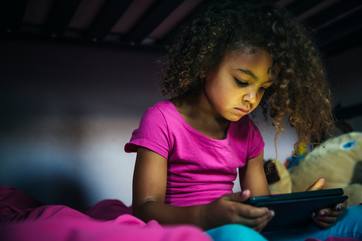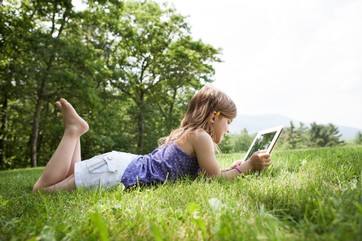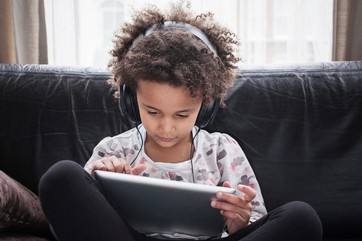Children today are often online, using phones, computers and electronic devices. So are their parents. Like it or not, electronics are a part of our children’s lives. Most of the time, children’s use of electronics is harmless, and can even be fun or enjoyable.

Parents often believe that supervision is key to their child’s experience with electronic devices. That is true. Supervision helps. However, even when we monitor what our children look at online, we often cannot monitor what their friends look at online. Although each school has policies about electronics use, children commonly can see what their friends are doing, what apps they are using, or what content they look at on their devices before school, after school, and at other times. Kids also share their electronics during slumber parties, get-togethers, and activities.
Occasionally, and often by accident, children become exposed to pornographic material online. In fact, in my practice, it seems that I address this issue with children, families (and schools) at least once or twice a year. The most common ages of children with accidental pornographic exposure are between the grades of 4 and 6 (ages 9-12). (This is consistent with the current literature of when this phenomenon occurs).
Parents and teachers often become alarmed to find out that their child was exposed to this content. Caregivers may find out about the exposure because a child says something, or because an adult found the content on the child’s device. Some children respond with complete disinterest, and some children respond with symptoms of shock and trauma. Every child is different. Every situation is different, and every exposure is different.
However, there are things that parents can do so that IF your child is accidentally exposed to pornographic material, you can minimize the stress, discomfort, and misinformation that your child experiences.

The first step to keeping your child safe is to make sure to provide appropriate sexual education with your child before you provide them with any unsupervised electronic use
Sexual education should be geared towards your child’s developmental age, and consistent with your values. It is a process, and parents should talk to their children about sexuality many times throughout their lives. If your child receives sexual education before they are accidentally exposed to material online, she will learn about sexuality in a loving, caring, healthy way. If violent or pornographic exposure does occur, hopefully your child will have a sense that this is not a typical sexual interaction, and not what you have explained to them. That means parents will need to start sexual education with their children early, most likely before they learn about it in school.
Some books that can be helpful to parents of young and middle-aged children on sexual education include:
- It’s Not The Stork by Robie Harris
- It’s Perfectly Normal by Robie Harris
- The Care and Keeping of You by American Girl
In addition, as parents in the 21st century, you will need to provide updated information to your children on electronics and sexuality

You should talk to your children about online safety, and what to do if they ever see sexualized content online. Explain that it is always important to tell an adult if they accidentally see something that shows nudity, sex, or sexual violence. Explain that this material is for some adults, and never meant to be seen by children. You should also talk to them about what to do if anyone ever sends them sexual pictures or asks them to send sexual pictures. Teach them to NEVER give their phone’s password away. As uncomfortable as talking about these issues can be, this will be an important part of keeping your child safe.
Parents will need to stay calm, factual, and respectful to their child in these discussions
It is natural for children to be curious about sex and sexual interactions. All people are curious about sexuality. However, your children are watching you to know how to respond. If you panic, so will they. If you shame them, they may never bring it up again. Find a way to talk to them plainly, but with love and concern. Education without blame or guilt will invite more discussion and openness on your child’s part. The goal is to get your child to ask questions, and come to you when something is wrong.
Keep schools in the loop
If your child was exposed to pornography at school, please let your child’s teacher and/or principal know. Your goal is not to get anyone into trouble, but to provide an opportunity for education and support for all the children involved. Also, it may help schools set better policies regarding media use.
For older children, direct communication and sexual education will be more important
Older children have more access to the internet, and less supervision at school. As parents, you should talk to your tweens and teens more about these issues, and occasionally review their viewing history. If their viewing history shows frequent access to online pornography, you will need to have a loving, but matter of fact, conversation about it. If you suspect your tween or teen has been using online pornography, you should also talk to your him or her. You may say something like, “I’ve noticed that you have been viewing a lot of online adult content lately. As your parent, and someone who cares about you, we need to talk about some of the risks of viewing this content.”

Unfortunately, some children will assume that pornography or online violent sexual activity is normal. You will need to ask about these beliefs and dispel them. Children need to know that these kinds of activities are not real, and are often staged to make money. They are not typical of sexual behavior in a loving and safe relationship. Furthermore, research tells us that by watching these kinds of online activity, teens are more likely to engage in riskier sexual activity, as well as sexuality outside of loving and caring relationships.
If your tween or teen is primarily curious and looking for information, you may also want to explore sexual education resources for teens. There are books and materials with age-appropriate content for teens and young adults as well. It is always good for parents to obtain and read through these books first to make sure that they are consistent with your family’s value and comfort level. However, these may include:
- Changing Bodies, Changing Lives: A Book for Teens on Relationships and Sex
- S.E.X., second edition: The All-You-Need-To-Know Sexuality Guide to Get You Through Your Teens and Twenties
Your child’s health and future sexual relationships may depend on your ability to talk to them about these kinds of situations and help prepare them for life in the 21st century
Do not despair. All parents find these situations difficult to talk about with their children, and you are not alone. But, you will feel much better knowing that you are providing sexual education to your children than relying on other random people that are online. Your children are watching you and counting on you to help.
![]()
